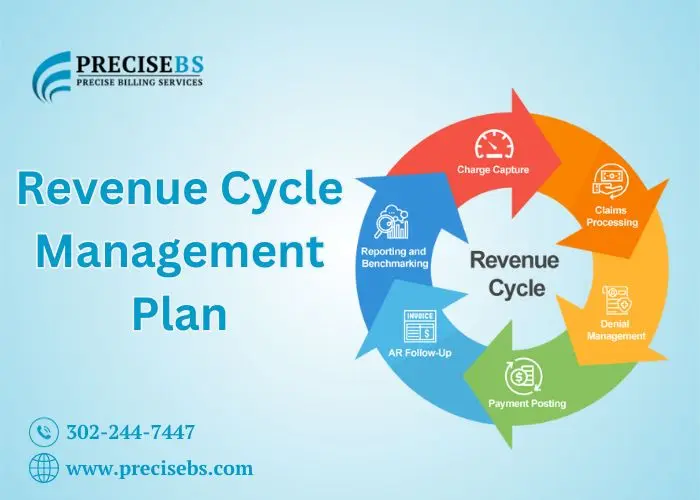Revenue Cycle Management Plan (RCM) in healthcare is a pivotal process influencing the financial vitality of medical practices. This article delves into the intricacies of RCM, offering sagacious advice for establishing an effective RCM plan that aligns with your healthcare practice’s needs.
Decoding Revenue Cycle Management
What is Revenue Cycle Management (RCM)?
RCM is the financial process that facilities use to manage the administrative and clinical functions associated with claims processing, payment, and revenue generation.
The Journey of a Patient’s Bill: The journey begins at patient registration and continues through service delivery, culminating in the final payment of a bill.
Key Components of a Strong RCM Plan
Patient Registration and Data Accuracy: Accurate patient data capture is critical. It ensures that the billing process starts on a solid foundation.
Charge Capture and Billing Integrity: Efficient charge capture and maintaining billing integrity are paramount for minimizing lost revenue and preventing billing errors.
Leveraging Technology in RCM
The Role of Automation and Software Solutions: Automation and innovative software solutions streamline the RCM process, reducing manual errors and saving time.
Integrating Electronic Health Records (EHR): The integration of EHR systems enhances data accessibility, improving overall efficiency.
Financial Policy Development
Establishing Clear Payment Policies: Clear, transparent payment policies are essential for smooth financial operations and patient understanding.
Enhancing Transparency with Patients: Transparency with patients regarding financial policies mitigates confusion and improves patient satisfaction.
Claim Management Strategies
Efficient Claim Submission Processes: Implementing efficient claim submission processes minimizes delays and denials, optimizing revenue flow.
Handling Denials and Appeals: A robust system for managing denials and appeals is crucial for reclaiming revenue that might otherwise be lost.
Patient Engagement and Communication
Improving Patient Interaction and Satisfaction: Effective patient engagement strategies enhance satisfaction, impacting the financial health of practices positively.
Effective Communication Channels: Establishing open and effective communication channels with patients is vital for a smooth RCM process.
Performance Metrics and Analysis
Key Performance Indicators (KPIs) in RCM: Monitoring KPIs helps in assessing the efficiency and effectiveness of RCM processes.
Utilizing Data for Performance Improvement: Data-driven strategies are essential for continuous improvement in RCM performance.
Compliance and Regulatory Considerations
Navigating through Healthcare Regulations: Staying abreast of and complying with healthcare regulations is essential to avoid legal complications and penalties.
Ensuring HIPAA Compliance: Compliance with HIPAA is non-negotiable, ensuring patient data protection and privacy.
Also Read: Why Your RCM Strategy Requires Data and Analytics
Outsourcing RCM: Pros and Cons
When to Consider Outsourcing: Outsourcing RCM can be considered when in-house resources are insufficient or to improve efficiency.
Choosing the Right RCM Partner: Selecting a competent RCM partner is crucial for ensuring that your practice’s financial health is in good hands.
Continuous Improvement and Training
Importance of Ongoing Staff Training: Regular training for staff is vital to keep them updated with the latest RCM practices and technologies.
Embracing Continuous Improvement Culture: A culture of continuous improvement helps in adapting to changes in healthcare finance.
Conclusion
In sum, an efficacious Revenue Cycle Management plan is not just about managing finances; it is about integrating effective patient care with smart financial strategies. The future of RCM lies in embracing technology, prioritizing patient communication, and ensuring continuous improvement in processes.
Frequently Asked Question
Q: How important is patient registration in the RCM process?
Ans: Patient registration is crucial in RCM, as accurate patient information forms the foundation for the entire billing and claims process, directly impacting revenue flow.
Q: What role does technology play in modern RCM?
Ans: Technology, especially automation and EHR integration, plays a significant role in streamlining RCM processes, reducing errors, and saving time, thereby enhancing overall efficiency.
Q: Why is it important to have clear financial policies in healthcare practices?
Ans: Clear financial policies ensure transparency and understanding between healthcare providers and patients, leading to smoother financial transactions and increased patient satisfaction.
Q: What are the benefits and drawbacks of outsourcing RCM?
Ans: Outsourcing RCM can lead to increased efficiency and expertise, especially in complex billing scenarios. However, it may also lead to less control over the process and require careful selection of a trustworthy partner.
Q: How does continuous improvement impact RCM?
Ans: Continuous improvement in RCM ensures that practices stay up-to-date with the latest trends, technologies, and regulatory changes, leading to optimized financial performance and patient service.

